Causal diagrams for empirical research
- 格式:pdf
- 大小:613.57 KB
- 文档页数:36
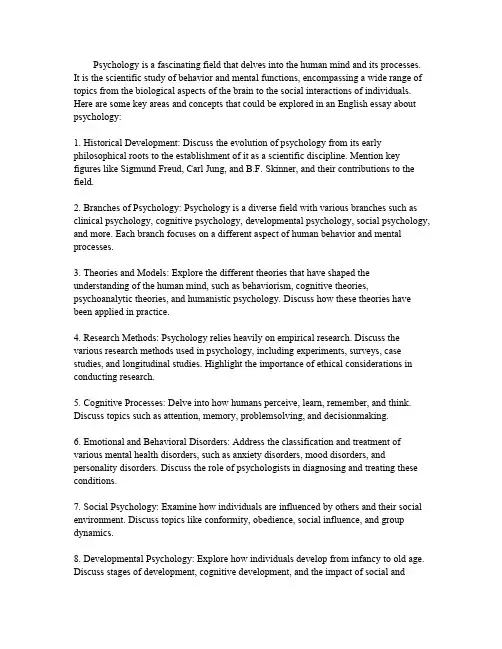
Psychology is a fascinating field that delves into the human mind and its processes. It is the scientific study of behavior and mental functions,encompassing a wide range of topics from the biological aspects of the brain to the social interactions of individuals. Here are some key areas and concepts that could be explored in an English essay about psychology:1.Historical Development:Discuss the evolution of psychology from its early philosophical roots to the establishment of it as a scientific discipline.Mention key figures like Sigmund Freud,Carl Jung,and B.F.Skinner,and their contributions to the field.2.Branches of Psychology:Psychology is a diverse field with various branches such as clinical psychology,cognitive psychology,developmental psychology,social psychology, and more.Each branch focuses on a different aspect of human behavior and mental processes.3.Theories and Models:Explore the different theories that have shaped the understanding of the human mind,such as behaviorism,cognitive theories, psychoanalytic theories,and humanistic psychology.Discuss how these theories have been applied in practice.4.Research Methods:Psychology relies heavily on empirical research.Discuss the various research methods used in psychology,including experiments,surveys,case studies,and longitudinal studies.Highlight the importance of ethical considerations in conducting research.5.Cognitive Processes:Delve into how humans perceive,learn,remember,and think. Discuss topics such as attention,memory,problemsolving,and decisionmaking.6.Emotional and Behavioral Disorders:Address the classification and treatment of various mental health disorders,such as anxiety disorders,mood disorders,and personality disorders.Discuss the role of psychologists in diagnosing and treating these conditions.7.Social Psychology:Examine how individuals are influenced by others and their social environment.Discuss topics like conformity,obedience,social influence,and group dynamics.8.Developmental Psychology:Explore how individuals develop from infancy to old age. Discuss stages of development,cognitive development,and the impact of social andcultural factors on development.9.Applied Psychology:Discuss how psychology is applied in various settings,such as education,business,sports,and healthcare.Highlight the role of psychologists in improving performance,wellbeing,and mental health.10.Ethical Issues:Address the ethical dilemmas that psychologists may face,such as confidentiality,informed consent,and the use of animals in research.11.Future of Psychology:Speculate on the future trends and developments in the field of psychology,including advances in technology,new research methodologies,and the potential for interdisciplinary integration.12.Cultural Perspectives:Discuss how cultural differences can influence psychological theories and practices.Consider the importance of cultural competence in understanding and treating diverse populations.13.Neuropsychology:Explore the relationship between the brain and behavior,focusing on how brain injuries or diseases can affect cognitive and emotional functioning.14.Positive Psychology:Discuss the relatively new field of positive psychology,which focuses on the study of happiness,wellbeing,and human strengths.15.Psychological Assessment:Explain the various tools and techniques used by psychologists to assess cognitive abilities,personality traits,and mental health status.When writing an essay on psychology,it is crucial to use clear and concise language, provide examples to support your arguments,and cite reputable sources to back up your claims.Additionally,it is important to maintain an objective and scientific tone throughout the essay.。
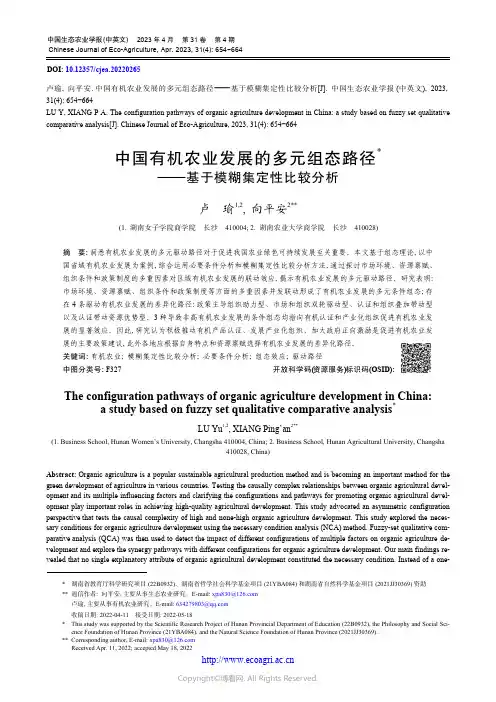
DOI: 10.12357/cjea.20220265卢瑜, 向平安. 中国有机农业发展的多元组态路径−基于模糊集定性比较分析[J]. 中国生态农业学报 (中英文), 2023, 31(4): 654−664LU Y, XIANG P A. The configuration pathways of organic agriculture development in China: a study based on fuzzy set qualitative comparative analysis[J]. Chinese Journal of Eco-Agriculture, 2023, 31(4): 654−664中国有机农业发展的多元组态路径*−基于模糊集定性比较分析卢 瑜1,2, 向平安2**(1. 湖南女子学院商学院 长沙 410004; 2. 湖南农业大学商学院 长沙 410028)摘 要: 洞悉有机农业发展的多元驱动路径对于促进我国农业绿色可持续发展至关重要。
本文基于组态理论, 以中国省域有机农业发展为案例, 综合运用必要条件分析和模糊集定性比较分析方法, 通过探讨市场环境、资源禀赋、组织条件和政策制度的多重因素对区域有机农业发展的联动效应, 揭示有机农业发展的多元驱动路径。
研究表明:市场环境、资源禀赋、组织条件和政策制度等方面的多重因素并发联动形成了有机农业发展的多元条件组态; 存在4条驱动有机农业发展的差异化路径: 政策主导组织助力型、市场和组织双轮驱动型、认证和组织叠加带动型以及认证带动资源优势型。
3种导致非高有机农业发展的条件组态均指向有机认证和产业化组织促进有机农业发展的显著效应。
因此, 研究认为积极推动有机产品认证、发展产业化组织、加大政府正向激励是促进有机农业发展的主要政策建议, 此外各地应根据自身特点和资源禀赋选择有机农业发展的差异化路径。
关键词: 有机农业; 模糊集定性比较分析; 必要条件分析; 组态效应; 驱动路径中图分类号: F327开放科学码(资源服务)标识码(OSID):The configuration pathways of organic agriculture development in China:a study based on fuzzy set qualitative comparative analysis*LU Yu 1,2, XIANG Ping’an2**(1. Business School, Hunan Women’s University, Changsha 410004, China; 2. Business School, Hunan Agricultural University, Changsha410028, China)Abstract: Organic agriculture is a popular sustainable agricultural production method and is becoming an important method for the green development of agriculture in various countries. Testing the causally complex relationships between organic agricultural devel-opment and its multiple influencing factors and clarifying the configurations and pathways for promoting organic agricultural devel-opment play important roles in achieving high-quality agricultural development. This study advocated an asymmetric configuration perspective that tests the causal complexity of high and none-high organic agriculture development. This study explored the neces-sary conditions for organic agriculture development using the necessary condition analysis (NCA) method. Fuzzy-set qualitative com-parative analysis (QCA) was then used to detect the impact of different configurations of multiple factors on organic agriculture de-velopment and explore the synergy pathways with different configurations for organic agriculture development. Our main findings re-vealed that no single explanatory attribute of organic agricultural development constituted the necessary condition. Instead of a one-* 湖南省教育厅科学研究项目(22B0932)、湖南省哲学社会科学基金项目(21YBA084)和湖南省自然科学基金项目(2021JJ30369)资助** 通信作者: 向平安, 主要从事生态农业研究。
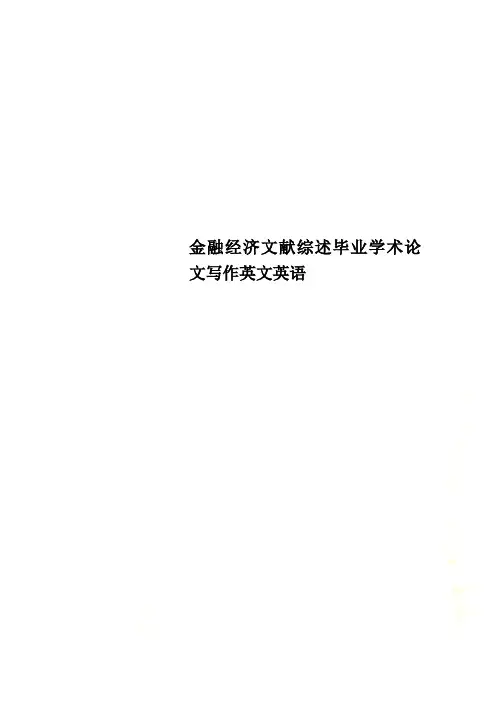
金融经济文献综述毕业学术论文写作英文英语山东财经大学《学术论文写作》期末考试文献综述题目:Literature Review of EconomicAccounting关于经济核算的文献综述学生姓名:杨振院系:国际交流学院专业、班级:10级中英二班学号:20101113221完成时间:2013年5月6日Literature Review of Economic Accounting Abstract: Current GDP is criticized because of not reflect the negative impact that brought from depletion and deterioration of resources environment to national economy sustainable development. Revised basic idea is: To national accounts as a starting point, use the effect of economic process to use the environment resources as the input of economic output and be accounted, finally find GDP that after adjusting for economic resources environment, the green GDP.Key words: GDP, the green GDP, value index of resources environment accounting, reviseGDP has been advocated by Keynes generation master of economics, it thought useful basis for reflect the supply, demand, unemployment and other issues in the economic order, is the most important indicator that measure if the country is progressive and the degree of progress. However, since 70s, with the sharply increasing of population, consumption of natural resources and increasing environmental damage, there is growing recognition that traditional GDP index system can’t Accurately reflec t a country's economic, social and cultural progress and sustainable development level of ability, because it does not account for the negative economic impact of sustainable development by deforestation, environmental pollution, soil erosion, resource depletion and destruction of the ozone layer. Not reflect the potential cost, potential benefits and eco-social, Unable to handle the demographic, economic, social, environment and resource coordination problem, on the contrary, unlimited consumption on the environment become a powerful booster and source of power of GDP. This is contrary to the sustainable development theory. So active in the resource environment and economic accounting, serious depletion of resources and protection of the environment's impact on GDP, Improve this important indicator of the GDP of great significance. This study is only upholding the premise of sustainable development, with GDP but was directly related to the current GDP ignores the value of those resources and environment accounting and with the intrinsic link between GDP. In order to facilitate the collection of information and relatively accurately calculated, we will account for the content of natural and environmental resources are divided into nine categories, namely mining and energy resources, land resources, water resources, forest resources, marine resources, grassland resources, wildlife resources, renewable resources and environmental resources, accounting again on this basis the cost of depletion of resources and the environment, resources,environment, loss cost, resources and environment restoration costs and the cost of renewable resources and environmental protection costs, resources and environment of the replacement cost and opportunity cost, and improve the income, resources and environment (green income), which constitute the six indicators should directly adjust the value of GDP accounting system.1.Researches abroad1.1Previous studies (50, 60 s of the 20th century)Gayle and Shaw Edward Shaw, think in terms of financial and real economy relations, the role of the financial lies in the savers savings into investment, so as to improve the level of social productive investment.《the financial structure and financial development》, laid the foundation of the theory of financial development.he lasted for more than hundred years, the statistical data of 35 countries, the financial structure and financial development for the history of the international comparison of horizontal and vertical comparison, thus reveals the financial development with regularity in the process of conclusion.1.2formation and development (70-80 - s of the 20th century)Mckinnon and Shaw established a analysis of the relationship between financial deepening and economic growth framework focuses on the unique phenomenon of financial repression in developing countries.Mc Kinnon and shaw gave up the financial system in developed countries as the research object, to research financial problems in the developing world. Both weaken the ability of the financial system to gather financial resources, and make the financial system development stagnated or even reverse the situation.1.3The latest research (since 1990)King and Levine using data from 1960 countries in 1960-1989 analysis come to the conclusion that financial development can stimulate economic growth; And Levine put forward the integration of financial development can be achieved by long-term output growth to improve a country's financial system, so as to promote economic growth; Corrado Andini using the median regression technology proved Levine financial development and economic growth have a connection; But Andrea Vaona pointed out that more of the financial institutions of the effect on regional economic growth is bigger, and short-term financial term structure to the development of regional economy in larger.Resources and environment of the replacement cost and opportunity cost are for the protection of resources from depletion and deterioration of the environment occurs, a value of sacrifice, in the course of the current GDP accounting has been a true and properly reflected, therefore, no need for further adjustment.Improve the income, resources and environment (green income) is due toincrease in the number of resources and environmental quality improvement brought about, is the net increase in national wealth, should be a positive factor affecting GDP - an increase of entry.In summary we can conclude that: a revised GDP = GDP-existing resources and the environment due to join the equity price, the time adjustment factor, the environment adjustment coefficient and reduced profits - depletion of resources and environmental costs - the loss of resources and environmental costs - resources environmental restoration costs, recycling costs and protecting the environment and resources to improve cost income.2.Researches in ChinaDomestic scholars in studying western financial development theory, try to apply it in China's financial and economic development practice. His doctoral thesis of economic development in the financial contribution and efficiency are discussed emphatically in China's financial on quantity expansion and quality respectively on the economy, particularly emphasis on the financial efficiency is the key to the development of modern economy, and to improve the efficiency of Chinese financial from micro to macro level the constructive proposal.Tan Ruyong followed Levine model, using the quarterly data on China's financial development and economic growth, using ordinary least squares method, on the relationship between the financial development and economic growth in China by linear regression, and examines the deposit in turn monetary institutions and economic growth, the stock market and economic growth, and deposit money institutions , and the relationship of the stock market.Shi Yongdong using the granger causality test and based on the Douglas production function under the framework of econometric analysis, the relationship between financial development and economic growth in China has carried on the empirical research. Safely draw the conclusion that China's economic growth and financial development in the granger sense there is a two-way causal relationship, and it is concluded that the financial development to economic growth contribution of specific values.In view of the past research is mostly based on country level, the focus of the study and gradually turned to the field of regional finance and regional economy, the relationship between financial development and economic growth in the granular space. Because of regional finance and regional economy theory research and the literature is very limited, this article is only summary of the domestic scholar's related research.Liu Renwu in Hainan province's financial structure and financial development as the research object, from the perspective of history reappearance of Hainan finance development course, summarizes the Hainan development unsustainable financial deformity and financial institutional reasons.Xie Taifeng in the Beijing area the internal relation of financial development and economic growth for empirical analysis, think that the capital of financialdevelopment and economic growth has positive not only promote the relationship, and Granger causal relationship. On this basis, this paper combining the reality of Beijing, the Beijing finance development and financial center construction put forward the corresponding policy recommendations. Qian Fangming research on relationship between regional finance and regional development, on the basis of literature review, in 11 cities of Zhejiang province as the research object, using the econometric model of regional financial development and economic development relationship between the empirical analysis.3.ConclusionComprehensive the above studies, scholars at home and abroad research on financial development and economic growth is gradual, foreign scholars both in theoretical and empirical research in a leading position, and their research vision more open, more using cross-country data. Chinese scholars in combination with China's national conditions, provincial finance development and economic growth in China did a lot of research work. Chinese scholars theoretical research is weak, however, most research results stay on whether financial development promotes economic growth level, the empirical analysis used data are limited to basic financial development bank loans, slightly into the securities market, the next step research direction should be the combination of China's capital market development put forward the financial development theory with Chinese characteristics.Green GDP accounting are not used to replace the current GDP, but the green GDP as the current GDP, an important supplementary indicators, GDP amendment and improvement of existing play an important role. Although this amendment and require the help of more integrated sound, virtual estimation techniques, there are still many difficulties in the operation, but we "should take a series of steps (even if they are imperfect) to improve existing work, and not to concentrate solely limited to the imperfect nature of the attack on the crack of doom. "As the resources of many environmental factors, measurement is extremely complex, reference resources, a leading national environmental and economic accounting experience, such as industrialized countries, the U.S. defense expenditure data on the environmental establishment, the French account of natural heritage, Norway on oil, forests, fisheries and other important resources accounting; and if the developing countries of Mexico on oil depletion, the degradation of environmental assets, deforestation and land consumption accounting, etc., combined with China's reality, I believe that China should focus on energy resources, mineral accounting , land resources, water resources, forest resources, grassland resources and ecological environmental resources, the system code corresponding value of the physical scale and scale, this measure out of the resource environment adjusted GDP.The data resources and environment statistics and accounting, primarily relying on the resources and the environment department in charge of businessaccounting information and business summary environmental accounting information, and then supplemented by the special investigation is necessary to obtain a comprehensive, systematic, objective data After processing, sorting, and scientific projections, to obtain the number of current resources and the environment, quality indicators.Bibliography〔1〕Wu You, Cao Keyu. On natural resources and environmental accounting 〔J〕. Statistical Research, 1998, (2).〔2〕Gao Minxue, Hong Gu. On the overall awareness of environmental and economic accounting 〔J〕. Statistical Research, 1998, (3).〔3〕Xue Wei. Sustainable development and integrated environmental and economic accounting 〔J〕. Statistical Research, 1996, (6).〔4〕Zhou Dequn, Bao-Shu Chen, Yu-Shun Li. Valuation of environmental resources and sustainable development of coal industry 〔J〕. China Coal Economy College, 1998, (4).〔5〕Xie Hongli. On sustainable development indicators system of the comments (2) 〔J〕. Statistical Research, 1999, (1).〔6〕Zhuowen Yan and so on. Consistent with sustainable development needs of the total social cost accounting 〔J〕. Accounting Research, 1998, (7).〔7〕State Environmental Protection Administration. State of the Environment 〔N〕. China Environmental News 1999-06-17.〔8〕Chen Zhenyu, etc., on the depletable asset accounting several problems 〔J〕. Modern Finance, 1999, (6).〔9〕Dai Yiyi. Green GNP Accounting Research 〔J〕. Statistics and Decision, 1998, (3).〔10〕Jiang Yao Ming. GDP from the environmental point of view 〔J〕. Modern Finance, 1999, (9).〔11〕Ye Ping. Man and Nature: Ecological Ethics 〔J〕. Dialectics of nature, 1995, (5).。
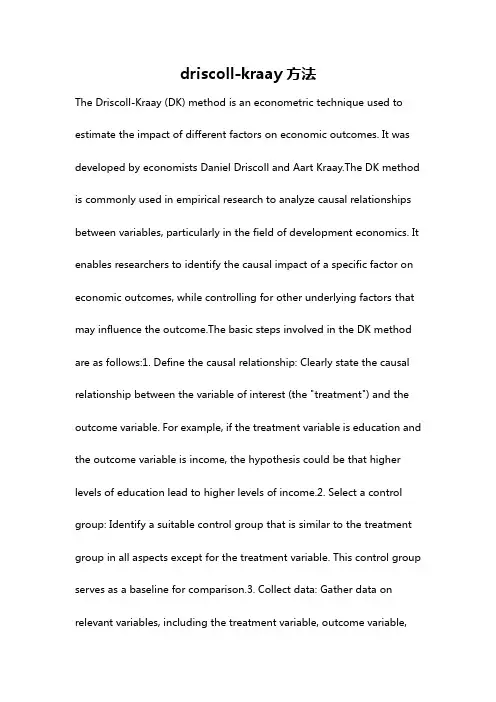
driscoll-kraay方法The Driscoll-Kraay (DK) method is an econometric technique used to estimate the impact of different factors on economic outcomes. It was developed by economists Daniel Driscoll and Aart Kraay.The DK method is commonly used in empirical research to analyze causal relationships between variables, particularly in the field of development economics. It enables researchers to identify the causal impact of a specific factor on economic outcomes, while controlling for other underlying factors that may influence the outcome.The basic steps involved in the DK method are as follows:1. Define the causal relationship: Clearly state the causal relationship between the variable of interest (the "treatment") and the outcome variable. For example, if the treatment variable is education and the outcome variable is income, the hypothesis could be that higher levels of education lead to higher levels of income.2. Select a control group: Identify a suitable control group that is similar to the treatment group in all aspects except for the treatment variable. This control group serves as a baseline for comparison.3. Collect data: Gather data on relevant variables, including the treatment variable, outcome variable,and potential confounding variables. It is important to have accurate and comprehensive data to ensure the validity of the analysis.4. Estimate the treatment effect: Use statistical techniques, such as regression analysis, to estimate the causal effect of the treatment variable on the outcome variable. The DK method employs specific econometric models, such as fixed effects or difference-in-differences, to control for other confounding factors.5. Interpret the results: Analyze the estimated treatment effect and draw conclusions about the causal relationship between the treatment variable and the outcome variable. It is important to consider the statistical significance and magnitude of the estimated effect.The DK method allows researchers to overcome the challenge of endogeneity, where the treatment variable may be endogenously determined by other factors. By carefully selecting control groups and employing appropriate statistical techniques, the DK method provides a robust framework for estimating causal effects in empirical research.。
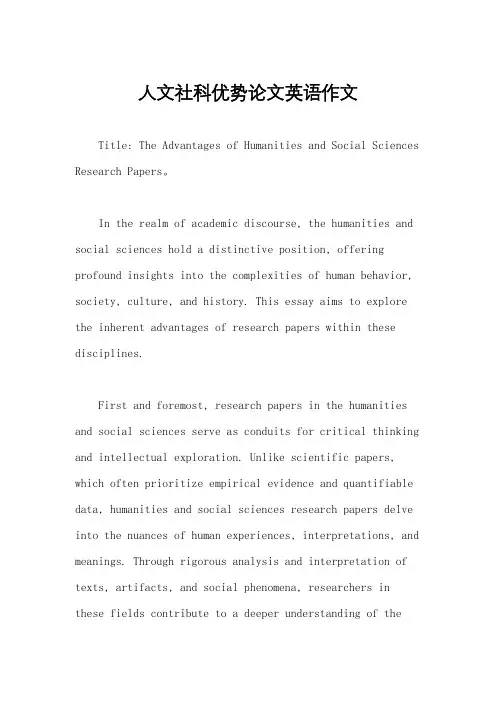
人文社科优势论文英语作文Title: The Advantages of Humanities and Social Sciences Research Papers。
In the realm of academic discourse, the humanities and social sciences hold a distinctive position, offering profound insights into the complexities of human behavior, society, culture, and history. This essay aims to explore the inherent advantages of research papers within these disciplines.First and foremost, research papers in the humanities and social sciences serve as conduits for critical thinking and intellectual exploration. Unlike scientific papers, which often prioritize empirical evidence and quantifiable data, humanities and social sciences research papers delve into the nuances of human experiences, interpretations, and meanings. Through rigorous analysis and interpretation of texts, artifacts, and social phenomena, researchers in these fields contribute to a deeper understanding of thehuman condition.Furthermore, humanities and social sciences research papers foster interdisciplinary dialogue and collaboration. Given the interdisciplinary nature of these disciplines, scholars often draw from multiple fields such as anthropology, psychology, literature, philosophy, and history to enrich their analyses. This interdisciplinary approach encourages scholars to transcend traditional disciplinary boundaries and engage with diverse perspectives, thereby fostering innovation and creativityin research.Moreover, research papers in the humanities and social sciences play a pivotal role in addressing pressingsocietal issues and promoting social change. By examining complex social problems through the lenses of gender, race, class, and power dynamics, researchers in these fields contribute valuable insights to public discourse and policy debates. Whether it's exploring the root causes of inequality, documenting marginalized voices, or advocating for social justice, humanities and social sciences researchpapers have the potential to catalyze meaningful societal transformation.Additionally, humanities and social sciences research papers prioritize qualitative research methods, which are well-suited for exploring subjective experiences and meanings. Unlike quantitative research, which often seeks to quantify phenomena and establish causal relationships, qualitative research allows researchers to delve into the intricacies of human behavior and social interactions. Through methods such as interviews, ethnography, and textual analysis, researchers in the humanities and social sciences capture the richness and complexity of human experiences.Furthermore, humanities and social sciences research papers contribute to the preservation and dissemination of cultural heritage and knowledge. By documenting historical events, cultural practices, and literary traditions, researchers in these fields ensure that diverse voices and perspectives are recorded and remembered for future generations. Moreover, through publications in academicjournals and conferences, scholars disseminate their findings to a global audience, enriching scholarly discourse and promoting cross-cultural understanding.In conclusion, humanities and social sciences research papers offer a multitude of advantages, ranging from fostering critical thinking and interdisciplinary collaboration to addressing societal issues and preserving cultural heritage. By embracing qualitative research methods and engaging with diverse perspectives, researchers in these fields contribute valuable insights to our understanding of the human experience. As such, the importance of humanities and social sciences research papers cannot be overstated in advancing knowledge, promoting social change, and enriching our collective understanding of the world.。
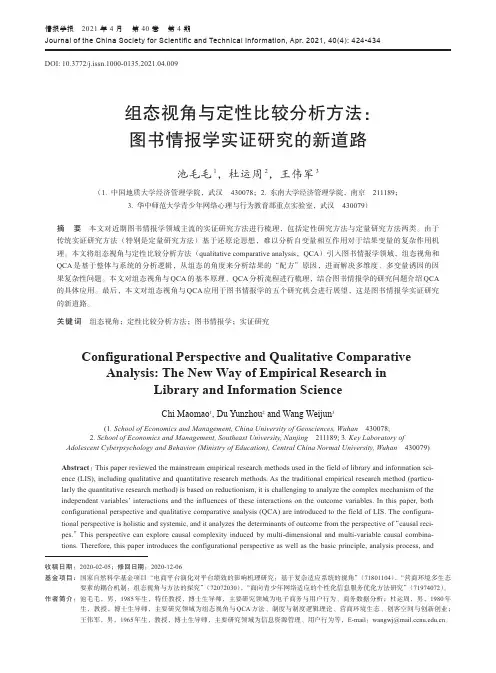
情报学报2021年4月第40卷第4期Journal of the China Society for Scientific and Technical Information,Apr.2021,40(4):424-434DOI:10.3772/j.issn.1000-0135.2021.04.009组态视角与定性比较分析方法:图书情报学实证研究的新道路池毛毛1,杜运周2,王伟军3(1.中国地质大学经济管理学院,武汉430078;2.东南大学经济管理学院,南京211189;3.华中师范大学青少年网络心理与行为教育部重点实验室,武汉430079)摘要本文对近期图书情报学领域主流的实证研究方法进行梳理,包括定性研究方法与定量研究方法两类。
由于传统实证研究方法(特别是定量研究方法)基于还原论思想,难以分析自变量相互作用对于结果变量的复杂作用机理。
本文将组态视角与定性比较分析方法(qualitative comparative analysis,QCA)引入图书情报学领域,组态视角和QCA是基于整体与系统的分析逻辑,从组态的角度来分析结果的“配方”原因,进而解决多维度、多变量诱因的因果复杂性问题。
本文对组态视角与QCA的基本原理、QCA分析流程进行梳理,结合图书情报学的研究问题介绍QCA 的具体应用。
最后,本文对组态视角与QCA应用于图书情报学的五个研究机会进行展望,这是图书情报学实证研究的新道路。
关键词组态视角;定性比较分析方法;图书情报学;实证研究Configurational Perspective and Qualitative ComparativeAnalysis:The New Way of Empirical Research inLibrary and Information ScienceChi Maomao1,Du Yunzhou2and Wang Weijun3(1.School of Economics and Management,China University of Geosciences,Wuhan430078;2.School of Economics and Management,Southeast University,Nanjing211189;3.Key Laboratory ofAdolescent Cyberpsychology and Behavior(Ministry of Education),Central China Normal University,Wuhan430079)Abstract:This paper reviewed the mainstream empirical research methods used in the field of library and information sci‐ence(LIS),including qualitative and quantitative research methods.As the traditional empirical research method(particu‐larly the quantitative research method)is based on reductionism,it is challenging to analyze the complex mechanism of the independent variables interactions and the influences of these interactions on the outcome variables.In this paper,both configurational perspective and qualitative comparative analysis(QCA)are introduced to the field of LIS.The configura‐tional perspective is holistic and systemic,and it analyzes the determinants of outcome from the perspective of“causal reci‐pes.”This perspective can explore causal complexity induced by multi-dimensional and multi-variable causal combina‐tions.Therefore,this paper introduces the configurational perspective as well as the basic principle,analysis process,and收稿日期:2020-02-05;修回日期:2020-12-06基金项目:国家自然科学基金项目“电商平台演化对平台绩效的影响机理研究:基于复杂适应系统的视角”(71801104),“营商环境多生态要素的耦合机制:组态视角与方法的探究”(72072030),“面向青少年网络适应的个性化信息服务优化方法研究”(71974072)。
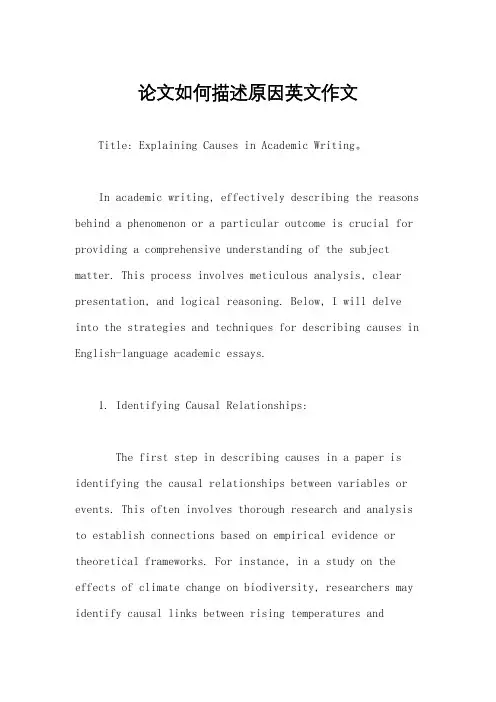
论文如何描述原因英文作文Title: Explaining Causes in Academic Writing。
In academic writing, effectively describing the reasons behind a phenomenon or a particular outcome is crucial for providing a comprehensive understanding of the subject matter. This process involves meticulous analysis, clear presentation, and logical reasoning. Below, I will delve into the strategies and techniques for describing causes in English-language academic essays.1. Identifying Causal Relationships:The first step in describing causes in a paper is identifying the causal relationships between variables or events. This often involves thorough research and analysis to establish connections based on empirical evidence or theoretical frameworks. For instance, in a study on the effects of climate change on biodiversity, researchers may identify causal links between rising temperatures andshifts in habitat suitability for certain species.2. Establishing Cause-Effect Chains:Once causal relationships are identified, it is essential to establish clear cause-effect chains. This means tracing the sequence of events or factors leading to a particular outcome. Using transitional phrases such as "as a result," "consequently," or "due to" can help signal these causal connections to the reader. For example, in an essay discussing the causes of income inequality, the author might delineate how factors such as globalization, technological advancements, and government policies contribute to disparities in wealth distribution.3. Providing Supporting Evidence:Describing causes effectively requires providing supporting evidence to bolster the argument. This evidence can take various forms, including statistical data, empirical research findings, expert opinions, or citations from authoritative sources. Incorporating relevant evidencelends credibility to the causal claims made in the paper. For instance, in an analysis of the causes of urbanization, the author might cite demographic trends, economic indicators, and urban planning literature to support assertions about migration patterns and infrastructure development.4. Considering Alternative Explanations:A thorough exploration of causes should also involve considering alternative explanations or competing hypotheses. Acknowledging and addressing alternative perspectives demonstrates intellectual rigor and fosters a more nuanced understanding of the topic. In academic writing, authors often anticipate counterarguments and refute them with sound reasoning or additional evidence. For example, in a study on the causes of political polarization, the author might discuss alternative interpretations of ideological divides and offer reasons why certain explanations are more compelling.5. Using Cause-and-Effect Language:Employing appropriate cause-and-effect language is essential for clarity and coherence in academic writing. This includes using verb phrases such as "leads to," "results in," "causes," and "triggers" to indicate causation explicitly. Additionally, employing causal connectors such as "because," "since," "as a consequence," and "therefore" helps signal causal relationships within sentences and paragraphs. Consistent use of such language facilitates understanding and strengthens the overall argument. For instance, in an essay on the causes of deforestation, the author might use phrases like "clear-cutting forests leads to habitat destruction," or "the expansion of agricultural land results in forest loss."In conclusion, describing causes in academic writing requires a systematic approach involving the identification of causal relationships, the establishment of cause-effect chains, the provision of supporting evidence, the consideration of alternative explanations, and the use of appropriate language. By following these strategies and techniques, writers can effectively elucidate the reasonsbehind phenomena or outcomes, contributing to the advancement of knowledge in their respective fields.。
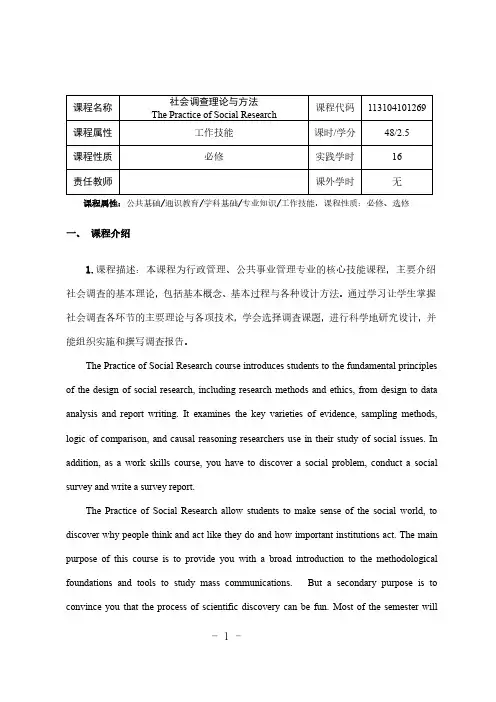
课程名称社会调查理论与方法The Practice of Social Research课程代码113104101269课程属性工作技能课时/学分48/2.5课程性质必修实践学时16责任教师课外学时无课程属性:公共基础/通识教育/学科基础/专业知识/工作技能,课程性质:必修、选修一、课程介绍1.课程描述:本课程为行政管理、公共事业管理专业的核心技能课程,主要介绍社会调查的基本理论,包括基本概念、基本过程与各种设计方法。
通过学习让学生掌握社会调查各环节的主要理论与各项技术,学会选择调查课题,进行科学地研究设计,并能组织实施和撰写调查报告。
The Practice of Social Research course introduces students to the fundamental principles of the design of social research,including research methods and ethics,from design to data analysis and report writing.It examines the key varieties of evidence,sampling methods, logic of comparison,and causal reasoning researchers use in their study of social issues.In addition,as a work skills course,you have to discover a social problem,conduct a social survey and write a survey report.The Practice of Social Research allow students to make sense of the social world,to discover why people think and act like they do and how important institutions act.The main purpose of this course is to provide you with a broad introduction to the methodological foundations and tools to study mass communications.But a secondary purpose is to convince you that the process of scientific discovery can be fun.Most of the semester will-1-focus on the fundamentals of quantitative social science and applied research,although we will also explore qualitative research.You will learn how to identify problems to study, develop hypotheses and research questions,specify independent and dependent variables, check for the validity and reliability of studies and design research projects.You will be exposed to the broad range of designs used in communication research from laboratory and field experiments,surveys,content analysis,focus groups and in-depth interviewing.2.设计思路:本课程根据社会调查的基本程序,从选题、研究设计、调查实施和调查总结几个阶段,引导学生掌握社会调查各环节的理论与方法。
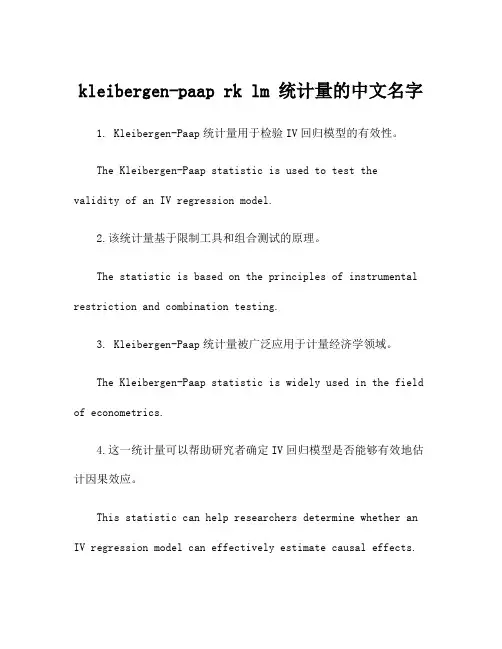
kleibergen-paap rk lm 统计量的中文名字1. Kleibergen-Paap统计量用于检验IV回归模型的有效性。
The Kleibergen-Paap statistic is used to test thevalidity of an IV regression model.2.该统计量基于限制工具和组合测试的原理。
The statistic is based on the principles of instrumental restriction and combination testing.3. Kleibergen-Paap统计量被广泛应用于计量经济学领域。
The Kleibergen-Paap statistic is widely used in the field of econometrics.4.这一统计量可以帮助研究者确定IV回归模型是否能够有效地估计因果效应。
This statistic can help researchers determine whether an IV regression model can effectively estimate causal effects.5.在计量经济学中,我们经常使用Kleibergen-Paap统计量来检验工具变量的有效性。
In econometrics, we often use the Kleibergen-Paapstatistic to test the validity of instrumental variables.6.通过计算Kleibergen-Paap统计量,我们可以获得关于IV回归模型性能的重要信息。
By calculating the Kleibergen-Paap statistic, we canobtain valuable information about the performance of an IV regression model.7.该统计量的中文名字是克莱伯根-帕普统计量。
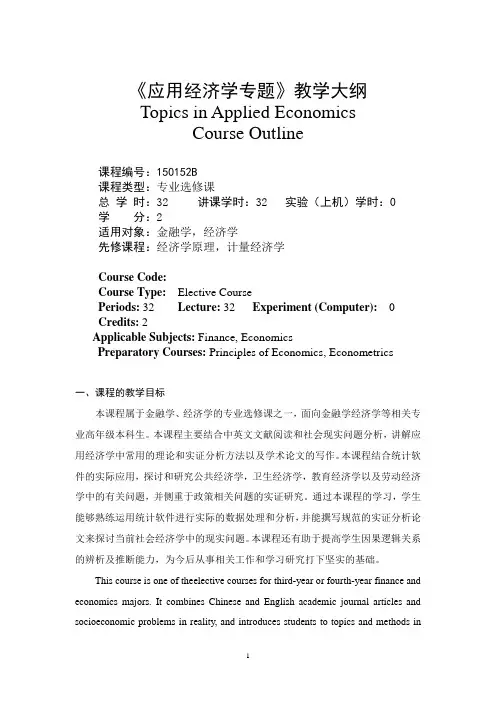
《应用经济学专题》教学大纲Topics in Applied EconomicsCourse Outline课程编号:150152B课程类型:专业选修课总学时:32讲课学时:32实验(上机)学时:0学分:2适用对象:金融学,经济学先修课程:经济学原理,计量经济学Course Code:Course Type: Elective CoursePeriods: 32 Lecture: 32 Experiment (Computer): 0Credits: 2Applicable Subjects: Finance, EconomicsPreparatory Courses: Principles of Economics, Econometrics一、课程的教学目标本课程属于金融学、经济学的专业选修课之一,面向金融学经济学等相关专业高年级本科生。
本课程主要结合中英文文献阅读和社会现实问题分析,讲解应用经济学中常用的理论和实证分析方法以及学术论文的写作。
本课程结合统计软件的实际应用,探讨和研究公共经济学,卫生经济学,教育经济学以及劳动经济学中的有关问题,并侧重于政策相关问题的实证研究。
通过本课程的学习,学生能够熟练运用统计软件进行实际的数据处理和分析,并能撰写规范的实证分析论文来探讨当前社会经济学中的现实问题。
本课程还有助于提高学生因果逻辑关系的辨析及推断能力,为今后从事相关工作和学习研究打下坚实的基础。
This course is one of theelective courses for third-year or fourth-year finance and economics majors. It combines Chinese and English academic journal articles and socioeconomic problems in reality, and introduces students to topics and methods inapplied economics and teaches students how to write an academic research paper. With the application of statistical software, the course involves relevant topics in public economics, health economics, education economics and labor economic and focuses on policy analysis. After taking this course, students will be able to master the methods of empirical analysisand use statistical software to do real data analysis and write a formal research paper to analyze current socioeconomic issues.This course will also provide students with an understanding of general methodology in applied empirical research, improve their logical thinking and lay a foundation for future work.二、教学基本要求本课程主要讲述公共经济学等应用经济学领域的研究理论与实证分析方法。
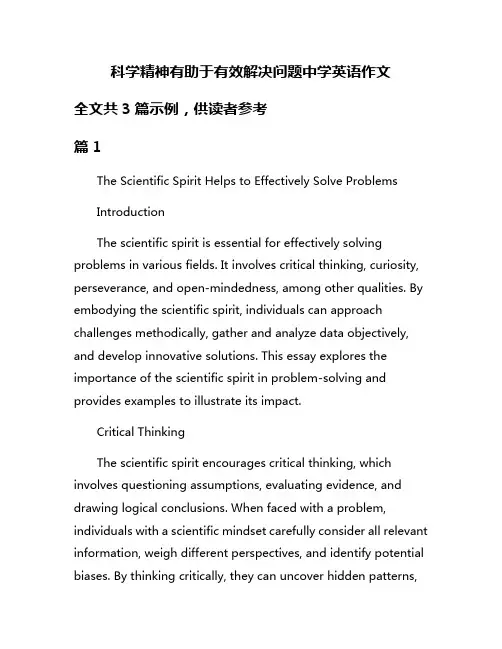
科学精神有助于有效解决问题中学英语作文全文共3篇示例,供读者参考篇1The Scientific Spirit Helps to Effectively Solve ProblemsIntroductionThe scientific spirit is essential for effectively solving problems in various fields. It involves critical thinking, curiosity, perseverance, and open-mindedness, among other qualities. By embodying the scientific spirit, individuals can approach challenges methodically, gather and analyze data objectively, and develop innovative solutions. This essay explores the importance of the scientific spirit in problem-solving and provides examples to illustrate its impact.Critical ThinkingThe scientific spirit encourages critical thinking, which involves questioning assumptions, evaluating evidence, and drawing logical conclusions. When faced with a problem, individuals with a scientific mindset carefully consider all relevant information, weigh different perspectives, and identify potential biases. By thinking critically, they can uncover hidden patterns,false correlations, and faulty reasoning, leading to more accurate problem analysis and solution development.CuriosityCuriosity is another key aspect of the scientific spirit. Curious individuals are eager to explore new ideas, ask insightful questions, and investigate unknown phenomena. Inproblem-solving, curiosity drives individuals to seek out information, experiment with different approaches, and discover creative solutions. For example, the renowned scientist Marie Curie's curiosity about the properties of radioactive elements led to groundbreaking research in the field of nuclear physics.PerseverancePerseverance is essential for overcoming challenges and setbacks in problem-solving. The scientific spirit encourages individuals to persist in the face of adversity, whether it be failed experiments, unexpected results, or conflicting theories. By staying committed to their goals and adapting their approach as needed, individuals can make progress towards finding solutions. Thomas Edison's famous quote, "I have not failed. I've just found 10,000 ways that won't work," exemplifies the importance of perseverance in problem-solving.Open-MindednessOpen-mindedness is crucial for considering diverse perspectives, exploring alternative solutions, and embracing new ideas. The scientific spirit encourages individuals to approach problems with an open mind, free from preconceived notions or biases. By being receptive to feedback, willing to reevaluate their assumptions, and open to collaboration with others, individuals can broaden their thinking and increase the likelihood of finding innovative solutions. For example, the discovery of the structure of DNA required collaboration between scientists with different backgrounds and expertise.ExamplesThe scientific spirit has played a significant role in solving complex problems throughout history. For instance, the development of vaccines for infectious diseases such as polio, smallpox, and COVID-19 relied on a scientific approach to understanding the pathogens, testing potential treatments, and conducting clinical trials. In addition, advancements in technology, such as the invention of the internet, smartphones, and renewable energy sources, have been driven by the scientific spirit of curiosity, critical thinking, perseverance, andopen-mindedness.ConclusionIn conclusion, the scientific spirit is essential for effectively solving problems in various fields. By embodying qualities such as critical thinking, curiosity, perseverance, andopen-mindedness, individuals can approach challenges methodically, gather and analyze data objectively, and develop innovative solutions. The examples provided demonstrate the impact of the scientific spirit in addressing complex problems and driving progress in science and technology. As we continue to face new challenges in the future, embracing the scientific spirit will be crucial for finding sustainable solutions and advancing society as a whole.篇2The Scientific Spirit Helps in Effective Problem SolvingIntroductionThe scientific spirit is a mindset that emphasizes critical thinking, logic, curiosity, and evidence-based reasoning. It is a fundamental approach in science that aims to understand natural phenomena and solve practical problems. In today's rapidly changing world, where new challenges continue to emerge, the scientific spirit plays a crucial role in effectivelyaddressing complex issues. This essay explores how the scientific spirit contributes to problem-solving and why it is essential in various areas of human life.Scientific Spirit in Problem SolvingThe scientific spirit serves as a guide for systematic problem-solving by encouraging a structured andevidence-based approach. It involves the following key principles:1. Critical Thinking: The scientific spirit promotes critical thinking by encouraging individuals to question assumptions, analyze evidence, and evaluate alternative explanations. This approach helps in identifying the root causes of problems and developing innovative solutions.2. Data-driven Decision Making: Instead of relying on intuition or anecdotal evidence, the scientific spirit emphasizes the importance of collecting and analyzing data to inform decision-making. By using quantitative and qualitative data, individuals can make more informed choices and evaluate the effectiveness of their solutions.3. Hypothesis Testing: In problem-solving, the scientific spirit involves formulating hypotheses based on existing knowledgeand testing them through empirical research. This process allows individuals to identify patterns, relationships, and causal factors that can lead to effective problem-solving strategies.4. Collaboration and Peer Review: The scientific spirit encourages collaboration and peer review to ensure the validity and reliability of research findings. By seeking feedback from peers and experts in the field, individuals can refine their ideas, identify potential biases, and improve the quality of their problem-solving efforts.5. Continuous Learning and Adaptation: The scientific spirit promotes a growth mindset that values learning from failures, embracing uncertainty, and adapting to new information. By being open to feedback and willing to revise their approaches, individuals can enhance their problem-solving skills and achieve more sustainable solutions.Applications of the Scientific SpiritThe scientific spirit is essential in various areas of human life, including:1. Scientific Research: In scientific research, the scientific spirit underpins the process of hypothesis testing, data analysis, and peer review. By following rigorous scientific methods,researchers can generate new knowledge, advance understanding, and contribute to solving pressing global challenges.2. Healthcare: In healthcare, the scientific spirit informs evidence-based medicine, clinical trials, and public health interventions. By applying research findings and best practices, healthcare professionals can improve patient outcomes, prevent diseases, and promote well-being in communities.3. Technology and Innovation: In technology and innovation, the scientific spirit drives creativity, experimentation, and problem-solving. By combining scientific knowledge with engineering expertise, innovators can develop new technologies, products, and services that address societal needs and improve quality of life.4. Environmental Sustainability: In environmental sustainability, the scientific spirit guides conservation efforts, biodiversity research, and climate change mitigation strategies. By integrating scientific data and models, policymakers can make informed decisions, implement effective policies, and protect natural resources for future generations.ConclusionThe scientific spirit is a powerful tool for effective problem-solving in a wide range of disciplines and contexts. By promoting critical thinking, data-driven decision-making, hypothesis testing, collaboration, and continuous learning, the scientific spirit empowers individuals to address complex challenges and make meaningful contributions to society. As we navigate the uncertainties of the 21st century, cultivating the scientific spirit is essential for building a more sustainable, equitable, and prosperous world. Let us embrace the scientific spirit and harness its transformative potential to solve the pressing problems of our time.篇3The Scientific Spirit Contributes to Effective Problem SolvingIntroductionThe scientific spirit plays a crucial role in our modern society. It is characterized by rationality, objectivity, curiosity, and an eagerness to explore and discover the unknown. This spirit not only drives advancements in science and technology but also helps in solving a wide range of problems in different areas. In this essay, we will explore how the scientific spirit contributes to effective problem-solving.The Scientific MethodAt the heart of the scientific spirit is the scientific method. This method involves the systematic observation, measurement, and experiment, and the formulation, testing, and modification of hypotheses. By following this method, scientists can gather accurate and reliable data, analyze it objectively, and draw valid conclusions. This systematic approach is essential for solving complex problems as it helps in identifying the root causes and developing effective solutions.Critical ThinkingCritical thinking is another key aspect of the scientific spirit. It involves questioning assumptions, evaluating evidence, and considering alternative perspectives. By engaging in critical thinking, we can avoid bias, errors in judgment, and logical fallacies. This allows us to approach problems with an open mind, consider all possible options, and make well-informed decisions based on evidence and reason.Problem-solving SkillsThe scientific spirit also fosters problem-solving skills. Scientists are trained to think analytically, creatively, and systematically. They are adept at breaking down complexproblems into smaller, more manageable parts, identifying patterns and trends, and developing innovative solutions. These problem-solving skills are not only valuable in scientific research but also in various other fields, such as business, engineering, and medicine.Collaboration and CommunicationEffective problem-solving often requires collaboration and communication. Scientists are accustomed to working in teams, sharing ideas, and exchanging information. They are also skilled at presenting their findings in a clear and concise manner, whether through written reports, oral presentations, or visual displays. This collaborative and communicative approach is essential for addressing interdisciplinary problems that require expertise from different fields.Adaptability and ResilienceThe scientific spirit emphasizes adaptability and resilience. Scientists understand that experimentation and innovation involve risks and uncertainties. They are willing to embrace failure as a learning opportunity, revise their hypotheses based on new data, and persevere in the face of challenges. This adaptability and resilience are crucial for overcoming obstaclesand finding creative solutions to problems that may seem insurmountable.ConclusionIn conclusion, the scientific spirit is a powerful tool for effective problem-solving. By following the scientific method, engaging in critical thinking, developing problem-solving skills, collaborating with others, communicating effectively, and being adaptable and resilient, we can address a wide range of challenges and achieve meaningful results. As we continue to apply the principles of the scientific spirit in our personal and professional lives, we will be better equipped to solve problems, make informed decisions, and contribute to the progress and advancement of society as a whole.。
粮食最低收购价与市场价关系的实证分析 以稻谷为例肖翔霞,张佳㊀(长江大学经济与管理学院,湖北荆州434023)摘要㊀粮食最低收购价格与市场价格是影响我国粮食安全和农民收入的两个重要因素,为进一步探究两者的关系,以稻谷为例,通过实证研究发现,最低收购价与市场价存在显著的因果关系㊂结果表明:从长期看,粮食最低收购价格与市场价格具有长期均衡关系,稳定调减最低收购价格对于推进粮食市场价格形成机制改革具有重要意义㊂从短期看,市场价格对于最低收购价格的影响要大于最低收购价对市场价格的影响,且最低收购价格对市场价的影响存在品种上的差异,粳稻最低收购价格对市场价的影响明显大于早籼稻和中籼稻最低收购价格对市场价的影响㊂基于上述结论,提出了相应的政策建议㊂关键词㊀最低收购价;粮食市场价;实证研究中图分类号㊀S-9㊀㊀文献标识码㊀A㊀㊀文章编号㊀0517-6611(2023)06-0223-05doi:10.3969/j.issn.0517-6611.2023.06.051㊀㊀㊀㊀㊀开放科学(资源服务)标识码(OSID):EmpiricalAnalysisoftheRelationshipbetweenMinimumPurchasePriceandMarketPriceofGrain TakingRiceasanExampleXIAOXiang⁃xia,ZHANGJia㊀(EconomicsandManagementSchoolofYangtzeUniversity,Jingzhou,Hubei434023)Abstract㊀Grainminimumpurchasepriceandmarketpricearetwoimportantfactorsaffectingfoodsecurityandfarmers incomeinChina.Tofurtherexploretherelationshipbetweenthem,thispapertakesriceasanexampleandfindsthroughempiricalresearchthatthereisasignificantcausalrelationshipbetweenminimumpurchasepriceandmarketprice.Theresultsshowedthat:Inthelongrun,theminimumpurchasepriceofgrainhasalong⁃termequilibriumrelationshipwiththemarketprice,andthestablereductionoftheminimumpurchasepriceisimportanttopromotethereformofthegrainmarketpriceformationmechanism.Intheshortrun,theimpactofmarketpriceonminimumpurchasepriceisgreaterthantheimpactofminimumpurchasepriceonmarketprice,andtherearespeciesdifferencesintheimpactofminimumpurchasepriceonmarketprice,withtheimpactofminimumpurchasepriceonmarketpriceofjaponicaricesignificantlygreaterthantheimpactofminimumpurchasepriceonmarketpriceofearlyindicariceandmediumindicarice.Basedontheabovefindings,correspondingpolicyrecommendationsareproposed.Keywords㊀Minimumpurchaseprice;Grainmarketprice;Empiricalstudy基金项目㊀湖北省教育厅科学技术研究项目(Q20191311)㊂作者简介㊀肖翔霞(1999 ),女,湖北宜昌人,硕士研究生,研究方向:农业经济政策㊂收稿日期㊀2022-05-09;修回日期㊀2022-06-20㊀㊀2020年12月28日习近平总书记在中央农村工作会议明确指出 要调动农民种粮积极性,稳定和加强种粮农民补贴,提升收储调控能力,坚持完善最低收购价政策 ㊂我国从2004年在粮食主产区实施最低收购价政策,自此粮食市场价与最低收购价紧密相连㊂2008 2014年,稻谷最低收购价格依据 成本加合理利润 的定价原则连续7次上调,与此同时,粮食市场价格亦一路攀升,触及价格 天花板 ㊂从2016年早籼稻最低收购价开始调减,到2017年稻谷最低收购价全面下调,市场价格也呈现出明显下降趋势㊂因此,不少学者认为,最低收购价政策托底市场价格一路走高[1],扭曲了市场价格形成机制[2-5],甚至对非执行区的市场价格也存在传递辐射效应[6]㊂但也有学者认为,粮食最低收购价政策作为一种政策手段,保持市场价格稳定,并不能从根本上影响市场价格,是市场经济与我国实际相结合的产物[7]㊂目前,关于粮食最低收购价格的研究主要集中于其政策效果的评价,就其与市场价格的关系研究相对不足㊂鉴于此,笔者主要探讨粮食最低收购价与市场价格的关系,以及在深化农业供给侧改革及农业高质量发展的背景下如何协调二者的关系,对完善粮食最低收购价政策以及促进农民增收㊁农业供给侧改革㊁农业高质量发展等具有重要的理论和现实意义㊂1㊀稻谷最低收购价与市场价关系的简要立论1.1㊀稻谷最低收购价与市场价的基本历史轨迹㊀稻谷最低收购价于2004年实施,2004 2007年保持稳定,早籼稻为1.40元/kg㊁中籼稻为1.44元/kg㊁粳稻为1.50元/kg,均低于当年市场价㊂由于最低收购价过低,2007年稻谷收储量难以支撑政府对稻米市场进行有效的宏观调控[8],因此,从2008年开始,稻谷最低收购价逐年上调,并于2013年开始超过市场价格的年度均值,早籼稻㊁中籼稻㊁粳稻的最低收购价分别比市场价高0.0368㊁0.0728㊁0.0634元/kg,至2014年,最低收购价达到最高值,2015年保持不变,2016年首次下调早籼稻最低收购价格,2017年开始全面下调稻谷最低收购价㊂与此同时,稻谷市场价格也在节节攀升㊂2004 2007年,在最低收购价格不变的背景下,早籼稻㊁中籼稻和粳稻市场价格平均每年以1.58%㊁2.37%㊁0.47%的幅度小幅上涨,但在2008年,当最低收购价格突然大幅上调之后,其市场价格迅速上升,早籼稻㊁中籼稻和粳稻当年的增幅分别达到19.41%㊁12.05%㊁7.08%㊂之后受市场规律的影响,市场价格在2009年增速明显放缓㊂2010 2011年,在粮食最低收购价连续提高之际,其市场价格呈现出更为强劲的上升趋势,早籼稻㊁中籼稻和粳稻的涨幅分别为21.04%㊁18.95%㊁4.62%㊂2012年之后,随着最低收购价格增速放缓,2017 2020年粮食市场价格的增速也明显回落㊂1.2㊀稻谷最低收购价与市场价的基本关系走势㊀为了更清晰和直观地了解稻谷最低收购价与市场价关系的走势,利用2004 2020年的有关数据,绘制二者的折线图(图1)㊂基于研究目的与数据的可获得性,该研究选取了2004 2019年早籼稻㊁中籼稻和粳稻的最低收购价与市场价的年度均值,数据来源于相关年份‘全国农产品成本资料收益汇编“和安徽农业科学,J.AnhuiAgric.Sci.2023,51(6):223-227㊀㊀㊀‘中国粮食发展报告“㊁2020年数据来自农业农村部㊁国家发改委及国家统计局官方网站㊂图1㊀稻谷最低收购价与市场价走势Fig.1㊀Trendofminimumpurchasepriceandmarketpriceofrice㊀㊀从图1可知,2004 2020年,稻谷最低收购价格与市场价格走势曲线非常相似㊂初期稻谷市场价相对低迷,最低收购价也保持低位运行;随后稻谷市场价格显著上涨,最低收购价格也进入快速上升通道;之后稻谷市场价格增速明显放缓,最低收购价也明显回落㊂2㊀粮食最低收购价与市场价关系的实证分析2.1㊀相关性分析㊀相关性分析是进行实证性分析的基础,只有相关程度显著,下一步的分析才有意义㊂相关系数反映了变量之间联系的密切程度,系数越高表明两者之间的关系越紧密,相关性越高,我国2004 2020年粮食最低收购价与市场价的相关性分析结果见表1㊂表1㊀稻谷最低收购价格与市场价格的相关系数Table1㊀Correlationcoefficientbetweenminimumpurchasepriceofriceandmarketprice序号No.项目Project相关系数Correlationcoefficient1早籼稻市场价(X1)与最低收购价格(Y1)0.9612中籼稻市场价(X2)与最低收购价格(Y2)0.9463粳稻市场价(X3)与最低收购价格(Y3)0.959㊀㊀从表1可以看出,早籼稻㊁中籼稻和粳稻的最低收购价格与其市场价格的相关系数均高于0.94,说明两者存在显著的相关关系㊂2.2㊀单位根检验㊀由于粮食最低收购价和市场价为时间序列数据,由于经济变量时间序列数据多为非平稳序列,因此有必要对变量进行平稳性检验,该研究采用ADF检验方法,检验结果见表2㊂㊀㊀通过检验发现,粮食最低收购价格与市场价格的水平序列是非平稳的,但其一阶差分数据平稳,即均服从一阶单整,故需要用协整理论进一步分析两者之间长期均衡关系㊂2.3㊀Johansen协整检验㊀由于粮食最低收购价格与市场价都是一阶单整序列,为检验其是否存在长期稳定的协整关系,采用Johansen协整检验方法,检验结果见表3㊂由表3中最大统计量和轨迹统计量对应的P值可知,在0.05的显著性水平下,早籼稻和粳稻的最低收购价与其市场价均存在1个协整方程,中籼稻的最低收购价和其市场价存在2个协整方程,即稻谷最低收购价和其市场价之间存在着长期稳定的均衡关系㊂2.4㊀Granger因果检验㊀虽已证明稻谷最低收购价格和市场价格存在长期的均衡关系,但这种长期均衡关系究竟是最低价格的变动引起市场价的变动,还是市场价的变动引起最低价格的变动,需要对稻谷最低收购价格和市场价格进行Granger因果检验,检验结果见表4㊂表2㊀粮食最低收购价与市场价的ADF检验Table2㊀ADFtestofminimumpurchasepriceandmarketpriceofgrain变量Variable检验形式(C,T,K)Inspectionform(C,T,K)ADF统计量ADFstatistics5%临界值5%thresholdP值PvalueX1(C,T,1)-2.503050-4.0081570.3211Y1(C,T,1)0.349165-4.1078330.9940X2(C,T,1)-2.337509-3.9333640.3842Y2(C,T,1)0.021352-4.1078330.9851X3(C,T,1)-2.008605-3.9333640.5339Y3(C,T,1)-1.197149-3.9333640.8570ΔX1(C,N,1)-3.942288-3.2598080.0192ΔY1(N,N,1)-3.108806-1.9881980.0061ΔX2(C,N,1)-3.410352-3.2598080.0404ΔY2(N,N,1)-3.025015-1.9881980.0072ΔX3(C,N,1)-3.646369-3.2126960.0261ΔY3(N,N,1)-3.794029-1.9823440.0016㊀注:检验形式中C㊁T㊁K分别表示常数项㊁趋势项和滞后阶数(遵循SIC准则),Δ表示差分形式㊂㊀Note:Inthetestform,C,TandKrespectivelyrepresentconstantterm,trendtermandlaggingorder(followingSICcriterion),Δindicatesthedifferenceform.表3㊀CPI与PPI的Johansen协整检验Table3㊀JohansencointegrationtestofCPIandPPI协整序列CointegrationsequenceH特征值Characteristicvalue迹统计量Tracestatistics5%临界值5%thresholdP值PvalueY1X100.84305322.23128018.3977100.013810.1556441.8609963.8414660.1725Y2X200.71824918.18974015.4947100.019210.3208294.2557083.8414660.0391Y3X300.79274119.00652015.4947100.014210.1427961.6948673.8414660.1930㊀㊀由表4可知,在0.10的显著性水平下,早籼稻和中籼稻均只存在单向的Granger因果关系,即稻谷市场价格是导致其最低收购价格的Granger原因,最低收购价格不是其市场422㊀㊀㊀㊀㊀㊀㊀㊀㊀㊀安徽农业科学㊀㊀㊀㊀㊀㊀㊀㊀㊀㊀㊀㊀㊀㊀㊀㊀㊀㊀㊀㊀㊀㊀㊀㊀㊀2023年价变化的Granger原因,而粳稻的最低收购价格和市场价格互为Granger原因㊂为准确反映稻谷最低收购价格和市场价的关系,从两者因果关系出发,利用Excel构造了两者的非线性回归模型:㊀㊀Y1=30.037e0.0109X(R2=0.9467)(1)㊀㊀Y2=32.313e0.0105X(R2=0.9253)(2)㊀㊀Y3=28.993e0.0109X(R2=0.9479)(3)㊀㊀X3=55.045e0.0067Y(R2=0.9063)(4)㊀㊀从式(1)㊁(2)可知,早籼稻和中籼稻市场对最低收购价有显著正向影响,市场价每变化1个单位,早籼稻最低收购价将同向波动1.09%,中籼稻最低收购价也将同向波动1.05%㊂从式(3)㊁(4)可知,粳稻市场价与最低收购价之间显著正相关,粳稻市场价每变化1单位,会带动最低收购价同向波动1.09%;当粳稻最低收购价每变动1个单位,其市场价也将同向波动0.67%㊂2.5㊀脉冲响应函数㊀脉冲响应函数测量内生变量对误差的反映程度,即通过在扰动项上加上一个标准差大小的信息以观其对内生变量的现值和未来值的影响㊂2.5.1㊀早籼稻市价与最低收购价的脉冲响应函数分析㊂利用Eviews8.0模拟的早籼稻市价与最低收购价的脉冲响应路径曲线见图2㊂表4㊀CPI与PPI的Granger因果检验Table4㊀GrangercausalitytestofCPIandPPI零假设Zerohypothesis滞后阶数LagorderF⁃统计量F⁃statisticP值Pvalue结论Conclusion(0.10显著性水平)X1doesnotGrangercauseofY1199.71464.E-06拒绝零假设Y1doesnotGrangercauseofX110.448030.5201接受零假设X2doesnotGrangercauseofY21143.2188.E-07拒绝零假设Y2doesnotGrangercauseofX210.994190.3448接受零假设X3doesnotGrangercauseofY323.915210.0816拒绝零假设Y3doesnotGrangercauseofX327.338820.0244拒绝零假设图2㊀早籼稻市价与最低收购价的脉冲响应路径曲线Fig.2㊀Impulseresponsepathcurvebetweenmarketpriceandminimumpurchasepriceofearlyindicarice㊀㊀从图2(a)可知,最低收购价格对于来自市场价格一个标准差的冲击,在当期反映仅1%,但随后增大,并于第3期达到最大值10%,随后呈现下降趋势;从图2(b)来看,市场价面对早籼稻最低收购价一个标准差的冲击,并无显著反应㊂对比图2(a)说明,早籼稻市场价对最低收购价的影响显著大于最低收购价对市场价的影响,与之前Gromger因果检验的结果相吻合㊂从图2(c)来看,早籼稻最低收购价格对自身一个标准差的冲击,在当期也只是作出2%的反应,随后持续减弱;从图2(d)来看,早籼稻市场价格对自身一个标准差的冲击,在当期就表现出较大反应,接近9%,随后出现下降趋势㊂这说明,早籼稻最低收购价受市场价的影响大于受自身的影响;早籼稻市场价受自身的影响要大于来自最低收购价格的影响㊂2.5.2㊀中籼稻市价与最低收购价的脉冲响应函数分析㊂利用Eviews8.0模拟的中籼稻市价与最低收购价的脉冲响应路径曲线见图3㊂㊀㊀根据图3(a)可知,中籼稻最低收购价对于来自市场价一个标准差的冲击,在当期反映极小仅0.1%,但随后上升,在第3期达到最大值5.4%,之后呈下降趋势;从图3(b)看,中籼稻市场价对于其最低收购价的一个标准差冲击,当期反应为0,存在滞后效应,随后上升,也在第3期达到最高点4.9%,随后逐渐下降㊂对比图3(a)说明,中籼稻市场价格对最低收购价格的影响要大于其最低收购价格对市场价的影响,也进一步验证了之前Gramger因果检验的结果㊂从图3(c)来看,中籼稻最低收购价对于自身一个标准差的冲击,在当期反应较小,仅为1.6%,在第2期继续降低,但之后开始上升,在第4期达到最大值4.9%,随后呈现出下降趋势;从图3(d)来看,中籼稻市场价对于自身一个标准差的冲击,当期反52251卷6期㊀㊀㊀㊀㊀㊀㊀㊀㊀㊀㊀㊀㊀㊀㊀㊀㊀肖翔霞等㊀粮食最低收购价与市场价关系的实证分析应较大,接近5%,在第二期达到最大值6.8%,随后呈现出下降趋势㊂以上表明,中籼稻最低收购价受其市场价的影响要大于受自身的影响;中籼稻市场价受自身的影响大于受其最低收购价的影响㊂图3㊀中籼稻市价与最低收购价的脉冲响应路径曲线Fig.3㊀Impulseresponsepathcurvebetweenthemarketpriceandthelowestpurchasepriceofmediumindicarice2.5.3㊀粳稻市价与最低收购价的脉冲响应函数分析㊂利用Eviews8.0模拟的粳稻市价与最低收购价的脉冲响应路径曲线见图4㊂图4㊀粳稻市价与最低收购价的脉冲响应路径曲线Fig.4㊀Impulseresponsepathcurvebetweenmarketpriceandminimumpurchasepriceofjaponicarice㊀㊀从图4(a)来看,粳稻最低收购价格对于来自市场价格一个标准差的冲击,在当期仅2%的反应,随后增大,在第3期达到最大值8%,随后呈现下降趋势;从图4(b)来看,粳稻市场价对于来自最低收购价一个标准差的冲击,在当期没有反应,存在时滞,之后增大,并于第3期达到最高值11%,之后开始下降㊂对比图4(a)说明,在当期粳稻市场价格对其最低收购价格的影响稍强于最低收购价格对市场价格的影响,但后期最低收购价格对市场价格的影响要大于市场价格对其最低收购价格的影响,亦与前文的Granger因果检验结果相呼应㊂从图4(c)来看,粳稻最低收购价格对自身一个标准差的冲击,在当期反应在4%左右,第2期保持平稳,随后上升,并于第4期达到最大值11%,且持续至第5期,之后呈下降趋势;从图4(d)来看,粳稻市场价对自身一个标准差的冲击,在当期反应为6%,并于第2期达到最大值8%,之后呈下降趋势㊂以上说明,对于粳稻最低收购价而言,在前期主要受自身的影响,后期主要受市场价的影响;对于粳稻市场价而言,当期受自身的影响要大于来自其最低收购价的影响,但后期主要受最低收购价的影响㊂3㊀结论与建议3.1㊀结论㊀运用相关性分析㊁协整分析㊁Granger因果检验和622㊀㊀㊀㊀㊀㊀㊀㊀㊀㊀安徽农业科学㊀㊀㊀㊀㊀㊀㊀㊀㊀㊀㊀㊀㊀㊀㊀㊀㊀㊀㊀㊀㊀㊀㊀㊀㊀2023年脉冲响应函数分析等方法,对稻谷最低收购价和市场价进行了实证分析,得出如下结论:(1)稻谷最低收购价和市场价之间存在显著的因果关系㊂在0.10的显著性水平下,早籼稻和中籼稻的最低收购价与市场价只存在单向因果关系,即其稻谷市场价格是其最低收购价变化的显著原因;而粳稻的最低收购价和市场价互为Granger原因㊂(2)从长期来看,稻谷最低收购价和市场价之间具有长期均衡关系㊂即早籼稻和中籼稻最低收购价的提高主要是市场价格的推动,粳稻的最低收购价和市场价的走势是在其双方的长期博弈中形成㊂(3)从短期来看,稻谷最低收购价与市场价相互作用关系存在品种差异㊂对于早籼稻和中籼稻而言,市场价对最低收购价的影响显著大于最低收购价对市场价的影响,最低收购价受市场价的影响大于受自身的影响,市场价主要受自身影响;与之相反,粳稻最低收购价对市场价的影响大于市场价对最低收购价的影响,粳稻最低收购价在前期主要受自身的影响,后期主要受市场价的影响,粳稻市场价受自身当期的影响要大于来自其最低收购价的影响,但后期主要受最低收购价的影响㊂故就最低收购价对市场价影响的范围和时间长度而言并不足以撼动稻谷市场自身的规律,即最低收购价格对市场价格的影响终究是有限的㊂3.2㊀对策建议㊀在新的历史关口时期,粮食安全和农民增收是实现中华民族伟大复兴最广泛最深厚的基础[13-15]㊂因此,深刻认识粮食最低收购价和市场价关系对全面实施乡村振兴具有重要的现实意义㊂3.2.1㊀进一步增强政策弹性,深化稻谷价格形成机制改革㊂粮价作为百价之基,是最低收购价政策保驾护航的对象,故最低收购价的调整复杂而敏感,且暂时无法提供更好的替代方案,因此继续保留最低收购价政策框架实属必要㊂鉴于2016年早籼稻最低收购价的首次下调已作为改变市场价预期的 首发 ,2017年全面下调稻谷最低收购价又已打破价格水平 只升不降 坚冰,因此,赋予最低收购价政策更强的灵活性和弹性是大势所趋,具体可从适当延后最低收购价执行起止时间㊁提高预案启动条件㊁加大预案执行时间的跨度弹性以及相应提高收购稻谷的质量标准等方面入手㊂3.2.2㊀准确把控稻谷最低价调整的节奏和力度㊂早籼稻㊁中籼稻和粳稻最低收购价对其市场价的影响存在差异,因此区别稻谷品种针对性调整最低收购价改革的力度与重点,逐步将最低收购价调整至合理水平㊂(1)早籼稻与中籼稻需保持政策框架基本稳定,引导稻谷产品结构调整㊂在早籼稻与中籼稻的最低收购价与市场价的博弈中,市场价占据着主导地位,最低收购价的影响相对有限㊂即早籼稻与中籼稻最低收购价政策已趋于托底功能,兜底线㊁稳预期的政策效用较突出,可供早籼稻和中籼稻最低价政策调整的空间有限,因此政策调整的重点在于,要充分利用有限的可调控空间充分发挥最低价政策对稻谷品种结构的导向作用㊂考虑到稻谷种植结构的调整是一个长期的过程,需要最低收购价政策的逐步引导,故其后期调整的幅度不宜过大,需保持政策框架基本稳定,为优化稻谷产品结构提供明显指向性;品种上,重点调减早籼稻㊁增加粳稻生产;品质上,重点抓好质量提升和品牌创建㊂(2)粳稻最低收购价改革要更加强调稳中求进㊂基于粳稻最低收购价对市场价存在较强的托市效应,为更好地发挥市场机制作用,进一步激发市场活力,粳稻最低收购价的调整显得更为迫切㊂一方面,可以适当加大粳稻最低收购价下调的幅度,逐步将粳稻最低收购价调整至合理水平;另一方面,为了平减粳稻最低收购价大幅下调所产生的冲击,降低粳稻生产主体对最低收购政策的依赖性,可从粳稻入手开展粮食作物完全成本保险和收入保险试点,充分发挥农业保险在保护农民利益中的重要保障作用㊂(3)节本增效缩短改革阵痛期,实现增加农民收入和保障有效供给的双重目标㊂在稻谷价格提升受限的背景下,为分散最低收购价下调给粮农带来的收益风险,必须另辟蹊径,在有效控制稻谷种植成本㊁保障稻谷供给的同时,促进农户增收㊂一是提高资源环境利用集约度,将单一水稻种植发展为稻鱼㊁稻虾㊁稻蟹或稻虾鳅共作等立体农业,实现种养结合㊂二是从稻谷分布区域出发,将区域优势与品牌打造相结合,在全国形成 一区一品 的稻谷格局㊂立足于稻谷各个品种主产区,优化区域布局,整合小散乱品牌,集中培植发展主产区域公共品牌,突出绿色优质稻谷的打造和生态服务供给㊂参考文献[1]曹慧,张玉梅,孙昊.粮食最低收购价政策改革思路与影响分析[J].中国农村经济,2017(11):33-46.[2]王双进.粮食托市收购的困境及改革取向[J].经济纵横,2015(11):87-92.[3]李国祥.为什么要继续执行并完善最低收购价政策[J].农村经济,2016(4):3-7.[4]陈亭.我国粮食最低收购价的完善建议[J].改革与战略,2017,33(5):30-32.[5]兰录平.我国粮食最低收购价政策的效应和问题及完善建议[J].农业现代化研究,2013,34(5):513-517.[6]张建杰.对粮食最低收购价政策效果的评价[J].经济经纬,2013(5):19-24.[7]丁声俊.正确认识㊁评价和改进粮食 托市收购 政策[J].价格理论与实践,2013(10):11-15.[8]胡锋.政府因何提高2008年稻谷最低收购价[J].中国粮食经济,2008(2):23.[9]武拉平.新时代粮食安全观的新特点与新思维[J].人民论坛,2019(32):30-31.[10]刘兴舟,张建,庄晓林,等.中国粮食安全现状与应对策略[J].农业工程,2019,9(7):61-64.[11]陈锡文.粮食安全面临三大挑战[J].中国经济报告,2014(2):43-45.[12]郭惠武.营养供给角度的中国粮食安全分析[J].中国畜牧杂志,2022,58(9):314-320.[13]王一飞.我国粮食价格的影响因素分析[J].经济经纬,2016,33(6):54-59.[14]吴玲霞.贸易战和新冠疫情背景下中国稳定粮食价格策略研究[J].价格月刊,2020(8):20-23.[15]张昌,余炳文.粮食价格与居民消费价格水平联动效应研究[J].价格月刊,2022(2):28-34.[16]胡海燕,高志强.构建国家粮食安全长效机制的思考[J].安徽农业科学,2022,50(9):244-246.72251卷6期㊀㊀㊀㊀㊀㊀㊀㊀㊀㊀㊀㊀㊀㊀㊀㊀㊀肖翔霞等㊀粮食最低收购价与市场价关系的实证分析。
关于月亮影响心情的英语作文英文回答:The Influence of the Moon on Mood.The moon, a celestial body that has captivated humanity for centuries, has been the subject of numerous studies and folklore, exploring its potential impact on human behavior, particularly mood. While scientific evidence remains inconclusive, anecdotal accounts and empirical research suggest a possible correlation between the moon's phases and emotional well-being.Lunar Phases and Emotional Fluctuations.Ancient civilizations observed a connection between the moon's phases and changes in human behavior. During thefull moon, for example, some cultures believed that individuals were more prone to madness or heightened emotions. Conversely, the new moon was often associatedwith tranquility and calm.Modern research has partially corroborated these observations. A study published in the journal "Psychiatry Research" found that the rate of psychiatric admissions increased during the full moon, particularly for conditions such as anxiety and mood disorders. Another study in the journal "Nature and Science of Sleep" suggested that sleep disturbances, such as insomnia and nightmares, may be more prevalent during the full moon.However, it's important to note that these studies do not establish a causal relationship between the moon's phases and mood changes. Other factors, such as seasonal variations, social influences, or individual psychological predispositions, may contribute to these observed correlations.Lunar Rhythms and Biological Processes.Some researchers propose that the moon's gravitational pull may influence biological processes that regulate sleep,hormone levels, and mood. The moon's gravitational force can cause tides in the oceans, and some scientists believe that it may also affect the ebb and flow of bodily fluids, including those that carry hormones and neurotransmitters.For instance, one study found that melatonin levels, a hormone involved in sleep regulation, may be influenced by the full moon. Another study suggested that the full moon may increase the production of serotonin, a neurotransmitter associated with mood elevation.Psychological and Subjective Effects.Beyond potential biological mechanisms, the moon's phases may also exert psychological and subjective effects. The cultural associations and beliefs surrounding the moon can shape our perceptions and expectations. If we believe that the full moon is a time of heightened emotions, we may be more likely to experience them during that phase.Moreover, the moon's luminosity and visibility can influence our mood. On nights with a bright full moon, theambient lighting can affect our circadian rhythms and sleep patterns, which may indirectly impact our emotional state.Conclusion.While scientific evidence regarding the moon's influence on mood remains inconclusive, the anecdotal, cultural, and empirical observations suggest a possible correlation. The moon's gravitational pull, biological rhythms, and psychological effects may play a role in shaping our emotional experiences. However, it's crucial to recognize that these effects are likely complex, individualized, and influenced by a multitude of factors.中文回答:月亮对情绪的影响。
explanationExplanationIntroduction:In this document, we will explore the concept of explanation and its significance in various fields. Explanation is the process of providing clarity, understanding, and reasoning behind a certain phenomenon, event, or idea. It serves as a crucial tool for communication, problem-solving, and knowledge acquisition. Throughout this document, we will discuss the importance of explanations, various types of explanations, and different contexts in which explanations are required.Importance of Explanation:Explanation plays a vital role in both personal and professional lives. It enables effective communication by providing a clear understanding of complex ideas, concepts, and procedures. In educational settings, teachers often employ explanations to help students grasp challenging topics. Furthermore, in the workplace, employees useexplanations to share information, justify their actions or decisions, and solve problems effectively.Types of Explanations:1. Scientific Explanations:Scientific explanations aim to provide understanding of natural phenomena based on empirical evidence and logical reasoning. These explanations often follow the scientific method and involve hypotheses, experimentation, data analysis, and conclusion drawing. Scientific explanations are crucial for advancing knowledge in areas such as physics, biology, chemistry, and psychology.2. Technical Explanations:Technical explanations are specific to various fields such as engineering, computer science, or medicine. These explanations are often used to describe complex systems, processes, or technologies. They involve the use of technical language, diagrams, and step-by-step instructions to ensure clarity and accuracy.3. Causal Explanations:Causal explanations focus on identifying the cause-and-effect relationship between events or phenomena. They aim to provide reasoning behind why something happened or why certain outcomes occurred. Causal explanations are common in fields such as history, economics, sociology, and psychology, where understanding the causes of particular events or behaviors is essential.4. Conceptual Explanations:Conceptual explanations aim to clarify abstract or theoretical concepts. They break down complex ideas into simpler, more understandable components. Conceptual explanations are often employed in disciplines such as philosophy, mathematics, and literature, where deep understanding of abstract concepts is required.Contexts for Explanations:1. Education:Explanations are extensively used in educational contexts to facilitate learning. Teachers employ various strategies to explain new topics, clarify doubts, and enhance students' understanding. By providing clear explanations, educators promote critical thinking, problem-solving skills, and overall academic growth.2. Research and Science:Explanations play a central role in the research and scientific community. Researchers aim to explain their findings, hypotheses, and methodologies to colleagues and the wider scientific community. This facilitates knowledge sharing, collaboration, and ensures research transparency.3. Decision-Making:Explanation provides a foundation for informed decision-making in both personal and professional settings. By understanding the underlying reasons and justifications, individuals can evaluate options, weigh consequences, and make better choices. In organizations, managers often rely on explanations to explain their decisions to employees, stakeholders, and clients.4. Problem-Solving:Explanations are essential in problem-solving processes. By understanding the causes and mechanisms of a problem, individuals can develop effective solutions. Clear explanations also enable collaboration and effective communication within problem-solving teams.Conclusion:In conclusion, explanations serve as a crucial tool to provide understanding, clarity, and reasoning in various fields. Whether it is in education, research, decision-making, or problem-solving, explanations play a vital role in enabling effective communication, knowledge acquisition, and critical thinking. By understanding the importance and types of explanations, individuals can enhance their ability to communicate, solve problems, and make informed decisions.。
高三数学思维与解决问题英语阅读理解20题1<背景文章>Mathematical thinking is not only crucial in the classroom but also has extensive applications in our daily lives. For example, when we plan a trip, we need to calculate distances, estimate travel times, and budget expenses. This involves using basic arithmetic and logical reasoning. When shopping, we compare prices, calculate discounts, and make decisions based on value for money. Again, this requires mathematical skills.In cooking, we follow recipes that often involve measurements and proportions. Understanding ratios and fractions can help us adjust recipes to suit different numbers of people or personal tastes. Even in simple activities like arranging furniture in a room, we might consider symmetry and balance, which are concepts related to geometry.Moreover, problem-solving skills developed through studying mathematics can be applied to various real-life situations. Whether it's figuring out the best route to take to work, deciding how to allocate resources in a project, or analyzing data to make informed decisions, mathematical thinking plays a vital role.1. What is an example of using mathematical thinking when shopping?A. Choosing the most colorful product.B. Comparing prices and calculating discounts.C. Buying products without looking at the price.D. Randomly picking items.答案:B。
实证研究英文Empirical research refers to a type of research that is based on observation and experience rather than theory or speculation. It is a systematic and structured approach to study a particular phenomenon or problem using data collected through direct observation, experimentation, or surveys. The aim of empirical research is to test and validate theories by examining the relationship between variables and providing evidence to support or reject hypotheses.One of the major characteristics of empirical research is the reliance on data, which can be obtained through various methods. Observation is one common method used in empirical research, where researchers directly observe and record data about the phenomenon they are studying. For example, a researcher may observe and take notes on the behavior of individuals in a certain social setting.Experimentation is another method used in empirical research, where researchers manipulate variables and measure their effects on the outcome of interest. This method allows for causal inferences to be made, as researchers can control and manipulate the variables being studied. For example, in a drug trial, researchers may randomly assign participants to different groups and measure the effects of the drug on their symptoms.Surveys and questionnaires are also commonly used in empirical research to collect data. Researchers can design surveys to measure attitudes, beliefs, or behaviors of individuals. This method allows for large-scale data collection and can provide valuable insightsinto the opinions and behaviors of a specific population. For example, a researcher may distribute a survey to measure public opinion on a political issue.Once data is collected, it is then analyzed using statistical methods. This involves organizing, summarizing, and interpreting the data to draw conclusions. Statistical analysis allows researchers to examine the relationships between variables and determine if there is a significant association or difference.The results of empirical research are typically presented in a research paper or report. These papers follow a specific structure, including an introduction, literature review, methodology, results, and conclusion. The introduction provides context and background information on the research topic, the literature review examines previous studies, the methodology explains how the research was conducted, the results present the findings, and the conclusion summarizes and interprets the results.In conclusion, empirical research is a systematic and structured approach to study a phenomenon or problem using direct observation, experimentation, or surveys. It relies on data collection and analysis to test and validate theories. The results of empirical research can provide valuable insights and evidence to support or reject hypotheses.。
英语作文有关实验的题目Title: The Role of Experiments in Scientific Inquiry。
Introduction:In the realm of scientific exploration, experiments serve as the cornerstone for advancing our understanding of the natural world. Through systematic observation, measurement, and analysis, experiments enable scientists to test hypotheses, validate theories, and uncover new phenomena. This essay delves into the significance of experiments in scientific inquiry and their indispensable role in driving progress across various fields.Validity of Hypotheses:Experiments provide a means to assess the validity of hypotheses formulated by researchers. A hypothesis proposes a tentative explanation for a phenomenon based on existing knowledge or observations. Through experimentation,scientists subject these hypotheses to empirical scrutiny, either confirming or refuting their validity. By meticulously controlling variables and conditions, experiments offer a rigorous method for testing the predictions derived from hypotheses.Illustrative Example: 。